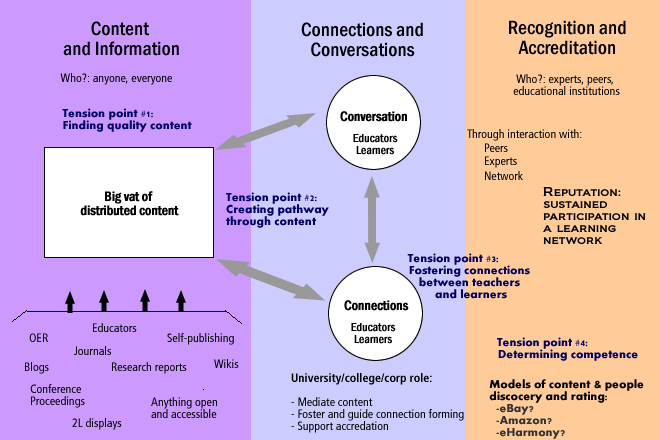Open Learning – the debate continues
 Continuing the open learning debate….I greatly like this diagramme by George Siemens. I think there is much of merit here. Very happpy to see acknowledgemnt of the importance of self publishing (as opposed to academic reporsitories). However there are a few things missed out.
Continuing the open learning debate….I greatly like this diagramme by George Siemens. I think there is much of merit here. Very happpy to see acknowledgemnt of the importance of self publishing (as opposed to academic reporsitories). However there are a few things missed out.
Firstly if we take congniscence of Jenny Hughes’ defintion of learning as ‘to find and follow a track’ as counterposed to curriculum from the latin ‘currere’, which means to run or race and ‘curriculum’ as race or racecourse, then instotutions and teacher have an important role in assisting learners in developing their own learning pathways.
A second important role is that of assessment. But to understand this we need to decouple assessment from acceditation. If we design assessment as a learning process and move from assessemnt of learning to asssessement for learning this could become an integral part of the process of finding and developing learning pathways. This is not so utopian. Serendipitously. The Times newpaper today published an article about innovative assessment in UK universities. The struggle, though, as with self and peer assessment is in assessment having to match accreditation procedures. Without this link, we could open up all jinds of new forms of assessment.
A final point on accreditation. Many learners do not want or require accreditation. Indeed it is the formal accreditation procedures which deters them for signing up for a learning programme. And as Antnio Fini, talking about the home made certificate he got from the OpenEd2007 course, says: “all my connections, blog posts, comments, collective works, presentations, articles related to that experience, are still out there as tangible proofs of this learning. So I could equally put the OpenEd course in my CV and could ask to my supervisor to evaluate all that activity for credit in my PhD, also without that piece of paper!”
Why not put the learners in charge of accreditation. Lets leave it to them to decide how they wish to show what and how they have learned – albeit with support. I once co-ran a course with Jenny Hughes where we offered the particpants their certificate at the start of the courese. They refused! But it did raise the issue of why they were doing the course and how they valued learning. And that is an issue we need to bring to the fore.

[…] learning link Posted on October 7, 2008 by Peter Evans A post on open learning from pontydysgu pointing to an interesting diagram from George Siemans. I like the diagram as it […]